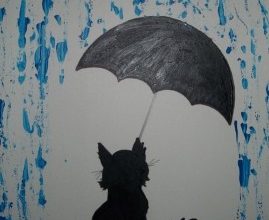Who is black and who is white? This is the first reactionary response posed as a question most readers exhibit after wrapping up Toni Morrison’s only known short story “Recitatif” first published in 1983 in Confirmation: An Anthology of African American Women. Ingenious in its narration, the author displays her craft which reveals as well as hides clues about the two protagonists- Twyla and Roberta to, in her own words, “experiment” on the readers about their preoccupation and prejudicial outlook towards race in a character’s interpretation in particular and life in general.
Recitatif | Summary
Recitatif is a story about two eight-year-old girls- Twyla and Roberta who meet each other at an orphanage named St. Bonaventure (St. Bonny’s). Twyla is the narrator of the story who narrates her multiple encounters with Roberta through flashbacks that span over roughly two decades. As kids, their first encounter is an unpleasant one due to the difference in race that Twyla’s mother fed her up with before admitting it to the shelter. However, they develop an understanding in no time by sharing commonalities such as low scores in exams and their mothers still existing in the world which leads to their status as outcasts in the shelter. A culture of bullying also dominates the environment when the big girls on the second floor push them time and again. Twyla and Roberta observe them in the orchards along with Maggie, a disabled kitchen woman who falls and becomes a subject of mockery.
Twyla has a dismissive stance toward her but at the same time feels concern for her too. But again humiliates her along with Roberta by calling out derogatory names to her. Then she recounts their mother’s visit which facilitates the first enforcement of difference between the girls. The mothers do not greet each other well due to Roberta’s mother and her on-the-face refusal to communicate with either Mary or Twyla. Roberta moves out after four months of her stay and fades in Twyla’s memory as time passes by.
Their second encounter is at Howard Johnson where Twyla is a teenager working a night shift and spots Roberta with two guys, drooling in makeup. She heads to greet her and a wave of formality hits the two. Roberta is not at all excited to see Twyla, or as she pretends to, in front of the boys which is an awkward moment for Twyla. After some customary exchanges, they depart without a goodbye and Twyla shifts the narrative to a few years later when she is married to her husband James. Her in-laws still uphold memories from the past and view their town of Newburgh just like the old days. But Twyla affirms about the change with the construction of a Food Emporium that sets the third location for her accidental meet-up with Roberta. The latter is married to a rich widow with four kids and both women giggle about their past spanning over some twenty years over a cup of coffee. This meeting turned out to be an unexpected one when compared to the one twelve years ago at Howard Johnson. In a momentary twist, Roberta challenges Twyla’s notion of Maggie being pushed by the bullies rather than falling on her own, posing a question on Twyla and her memory’s credibility.
The timelines tend to overlap for a bit during this encounter as Roberta reveals going back to the orphanage twice and witnessing Maggie’s humiliation and Miss Bozo’s termination which Twyla is unable to recall as she wasn’t present there to witness it, according to her own memory track. The allegation of witnessing Maggie’s troubles as a silent spectator distresses her and she snaps out at Roberta for being rude to her at Howard Johnson in an attempt to shift the onus of the seriousness of that situation. They part ways on the pretext to call each other but that never happens.
Their fourth encounter is amid racial strife dividing the students and sending them to other far-off schools in an attempt to remove segregation practices. They both stand at the opposite ends of the struggle. While Twyla believes it to be a positive impact, Roberta is against it. It is here when Roberta claims about Maggie being black and leaving Twyla in a puzzled mindset. The war slogans between the two become personal day by day until Twyla brings Roberta’s mother in. They eventually stopped attending the protests. Years later a realization about the dire need or wish to kick Maggie, though not hitting her in real, crops up in Twyla’s conscience and she recognizes the intent of Roberta’s allegations. She compares Maggie to her own mother Mary for multiple reasons and realizes the ideology supporting her dislike for the woman with disability.
The last encounter is on Christmas Eve when Twyla bumps into Roberta in a coffee shop and the latter nervously shares about her confusion over Maggie’s race and the fact they pushed her. They did not inflict any violence on Maggie but the strong urge to go with it equates their desires to the actual action and Roberta traps Twyla in her guilt for the same. The story ends with Roberta exclaiming in worry about Maggie and the lack of knowledge both share on the events circulating her life.
Recitatif | Analysis
Toni Morrison’s short story is unlike any other story that works on the issues of race and class in the canon of African-American literature. It is subtle yet sharp; clever yet innocent; humoristic yet sentimental; and revealing yet mysterious. The in-media res opening of the narrative by the first person narrator Twyla refuses to provide any context to the circumstances compelling the two girls- Twyla and Roberta to live in a state-sponsored orphanage despite their mother’s existence and live their lives. The entire narrative is set up as a series of flashbacks that disclose multiple encounters of the narrator with St.Bonny’s roommate Roberta as they meet at different junctures of their lives. Though the structure bears a chronological order of events with an overall time-lapse of twenty years, the credibility of memory is questionable at certain instances in the story. Memory writing thus becomes one of the concerns in this piece along with the lack of identification that the author ascribes to the two protagonists during their exchanges due to the absence of dialogue tags. Morrison messes with the readers by giving hints but then sparking speculation regarding those hints.
This little game, or in better words, the “experiment” she performs on the reader is to expose the prejudices and stereotypes that people around the world are conditioned with that assist their reading and interpretation of a character. By intelligibly rejecting all identity markers for Twyla and Roberta, Morrison’s craft not only confuses the reader throughout but also renders them frustrated for their desire to learn about their respective races. Here, the crucial question arises— why is it so important for us to know who is black and who is white in the story? What difference does it make? This is Morrison’s aim i.e. to introduce us to our own shallow belief system and learn about the futility of judging a human based on his/her appearance or skin color. Blackness is thus an idea or a set of perceptive meanings that are imposed, carrying nothing inherent in it.
Faulty memory as pointed out earlier operates in the story and reaches a vivid expression when Roberta manipulates Twyla’s memory by attempting to trick her into believing that they both were responsible for what happened to Maggie at the Orchard. Roberta tries to project her own guilt on Twyla by accusing her of being an equal bully to the woman with disability, of which the narrator has no remembrance. However, while the physical act of placing an injury on Maggie is definitely not on the cards, the bubbling wish to hurt her poignantly comes to light. Both Twyla and Roberta due to their personal life crisis want to dehumanize Maggie as she is powerless owing to her sandy skin texture and her disability that pushes her further away to the margins of the society. This double marginalization communicates how any human can be ripped off his/her humanity and is prone to dehumanization and humiliation. The already powerless try to suppress the ones below them in the social hierarchy instead of becoming a support system for them.
Wanting to hurt someone is equivalent to hurting him/her in truth. This wish arises out of Twyla’s association with Maggie as her “dancing mother” who is equally vulnerable to the world’s vices and a subject of scorn by many like Roberta’s mother and thus also a subject of Twyla’s hate. Maggie also becomes like Twyla who couldn’t support herself or cry for help in this harsh world and so witnessing her pain gives a sadistic pleasure to the latter. Similarly, Roberta also correlates Maggie to her own mother who grew up in an institution, subtly hinting her sickness to be the one related to mental health imbalance. Fearing her own fate to be just like her mother, Roberta wishes to rise above it and become superior to people belonging to that category.
The ambiguity of the memory comes to full expression at the end of the story when the reader feels perplexed and uncomfortable about the answer to the question —“What the hell happened to Maggie?” Not just the answer to the question but also the meaning and context of the question is puzzling too. Does it address the event after the children leave the orphanage forever or when they are present but ignore her misery? There is also a possibility that it interrogates the incident when Maggie falls in the Orchard in Twyla’s memory but is pushed in Roberta’s. Thus, the story ends on an unresolved note regarding Maggie’s fate and the actual events of the time when the girls stay in the orphanage but one aspect of their personality is certainly determined despite their conflicting memories, which caters to their fall and not Maggie’s. By being the silent spectators to her bullying in the Orchard signifying the Garden of Eden, the girls lose their innocence and hence humanity.
Appearances play a major role in the narrative as they serve as a basis for perception formation and ingrained ideologies. They imprint on the mind as the first thought about anyone. For Twyla, Maggie is nothing but an old woman who has legs like a parenthesis with a rocking walk. Her obnoxious kid’s hat with ear flaps is an act of dumb dressing- both literal and metaphorical since she is mute. It is these details about how Maggie looked that accompany Twyla through memories of her growing years, instead of the injustice and wickedness she experiences at the hands of the bully girls. Also, when the mothers of the two girls meet each other for the first time, it is the ‘appearance’ that denies Mary a pleasant gesture from Roberta’s mother. It is the adult world that allows racial issues to penetrate the innocent world of children.
Proceeding to the significance of the title, ‘recitatif’ is a French word meaning ‘recitative’ popularly used as a style of delivery in speeches that carries a touch of musicality along with it. It usually fills the connecting segments between different musical performances which also reflect in the lives of the two protagonists who connect with each other at different moments in time. The brief points of interaction with Roberta come together as Twyla’s “recitatif” as she narrates the syncing of their lives.
Thus, there is no denying that the story is preoccupied with contemporary racial politics but it lays down a greater thrust on the absence of racial identity markers to emphasize how any event in society affects all humans without any discrimination, though varying in its degree. So whether it is the guilt of relishing in Maggie’s helplessness, the consequences of the bus protests for school-going kids, eye scrolls when different races interact, and when memories betray you— both Twyla and Roberta are their victims. Race has nothing to do with how a human feels. It is a politically induced trap that suffocates everyone.
Recitatif | Themes
Racial Identity
Race is central to the story as the two protagonists— Twyla and Roberta belong to different ones and the readers are unaware of it. They couldn’t decipher whether Twyla was black or white and the same for Roberta. This dilemma fuels the question of identity that defines itself on the basis of one’s race in 20th-century America. Race determines your social standing as it follows the rigid dictates of corrupt and biased political institutions. However the style of narration renders the task of identification complex as everything Twyla and Roberta do or experience are possible actions for both whites and blacks. This ambiguity also ties Maggie to them as her “sandy-colored” skin does not allow casting her into either of the categories.
Memory
Memories can often betray us on their recollection. They are never a reliable medium to communicate an important piece of information which is a limitation this story also suffers from. Twyla fails to remember if Maggie is white or black and whether she falls or is pushed by the big girls. Similarly, Roberta confesses her confusion over hitting Maggie with Twyla which spills out a doubt for the readers on their respective statements. Who should they believe? Twyla or Roberta? There is no answer to it because memory is the resting place of the past and to know the truth, one needs to dig up that past which is as unpleasant as it can be for the two women. It might be for this that Morrison opts to end her narrative with a lingering quest that forces her to open the window to the past which none of the protagonists wish to.
Recitatif | Characters
Twyla– She is the narrator of the story who recounts her memories with Roberta, her roommate and friend from the orphanage. Her race is unknown but over the years, she marries a fireman named James and has a son Joseph. She resides happily with her family at Newburgh. She is a supporter of the cause that protests for the school kids being sent out to schools outside the town, in order to abolish the segregation policy. However, her guilt over intending to harm Maggie makes her a fallen woman who loses her innocence at a young age.
Roberta– Twyla’s roommate at the St. Bonaventure orphanage, she is similar to her friend when it comes to failure in education and the outcast position they occupy there. But she is also different when it comes to opinions as observed in the picketing instance. Over the years, she marries a widow Kenneth Norton, and lives a luxurious life and time again projecting a mean demeanour towards Twyla on their different encounters. Her guilt of willingly desiring to hurt Maggie consumes her by the end of the story as she bursts into tears upon the said realization. However, acknowledging her confusion with Twyla at the climax of the story builds suspicion over her character’s honesty. She is more dynamic than Twyla.
Maggie– She is the “old,” “sandy-colored,” and disabled woman who worked in the kitchen at St.Bonny’s. Often a subject of ridicule and bullying, her muteness and “parentheses” legs (possible condition of rickets) render her a weak character who couldn’t speak for herself against her bullies. No one really knows what happened to her after the incident of her “fall” which on a later recollection is revealed to be a deliberate act of pushing her down. Twyla only remembered her from her appearance and funny clothes in her perception thus never allowing a deeper sentiment to develop for this character. It is Roberta who sowed the seed of Maggie’s race as a black woman which she later dismissed as a blur in memory. She is a mystery never resolved.
Mary– She is Twyla’s “dancing” mother where no context for such a characteristic is plotted in the entire story. However, dancing is considered a euphemism in popular interpretations for illegal and sexual activities. It is she where the line for prejudices begins as Twyla recounts her mother’s conditioning about the people from Roberta’s community “never washed their hair and they smelled funny.” Her taste in fashion is disastrous according to her daughter with “those green slacks” and “fur jacket with the pocket linings” in the chapel. But with a pretty face, smile, and excitement, she appears to be a kid just like her daughter.
Roberta’s Mother– Addressed as always the “sick” one; she is described by Twyla as “bigger than any man… [wearing] the biggest cross” on her chest with a Bible in her hand. Her mannerisms are cold towards Mary and thus refuses to greet her or Twyla.
James Benson- He is Twyla’s simple-minded husband.
Big Bozo – Formally Ms. Itkin, is the authoritative nanny who is responsible for all the orphans in the state institution.
Recitatif | Literary Devices
Simile
“So for the moment it didn’t matter that we looked like salt and pepper standing there and that’s what the other kids called us sometimes.”
“The kitchen woman with legs like parentheses.”
“James is as comfortable as a house slipper.”
“We sat in a booth by the window and fell into recollection like veterans.”
“Your mother with that cross like two telephone poles.”
“I swayed back and forth like a sideways yo-yo.”
Metaphor
“I meant just to go down to the school and tack it up somewhere so those cows on the picket line across the street could see it…”- The protesting mothers are compared to cows herding on the road.
Transferred Epithet
“…we weren’t real orphans with beautiful dead parents in the sky.”
Allusion
“I used to dream a lot and almost always the orchard was there. Two acres, four maybe, of these little apple trees. Hundreds of them.” This is an allusion to the Biblical Garden of Eden where Adam, the first man commits the sin of eating the apple from the Tree of Knowledge.
Irony
“I don’t know why I dreamt about that orchard so much. Nothing really happened there. Nothing all that important, I mean.” – This is an instance of dramatic irony where the readers decipher the true events in relation to Twyla’s memory after reading the entire story. Maggie’s physical abuse does happen in the orchard and both the girls are witnesses to it which they live in denial about for a long, ignoring it as a “fall” rather than an inflicted violence. The choice of being a silent participant in the scene renders Twyla’s initial claim ironic.
“Roberta promised to write every day, which was really sweet of her because she couldn’t read a lick so how could she write anybody.”
Humor
“Mary was still grinning because she’s not too swift when it comes to what’s really going on. Then this light bulb goes off in her head and she says “That bitch!” really loud and we are almost in the chapel now.”
Contrast
“Half the population of Newburgh is on welfare now, but to my husband’s family it was still some upstate paradise of a time long past.”
“Once, twelve years ago, we passed like strangers…Now we were behaving like sisters separated for much too long.”
Symbolism
Klondike ice cream– It is a bar of ice cream coated with chocolate signifying amalgamation or coming together of different colors, in this case, the races where it is difficult to determine who is who. Like the ice cream which is eaten in harmony (the chocolate and the ice cream in it) and not separately, races can co-exist without any identification markers because, in the end, everyone is essentially a human first.




